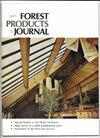Heartwood and Sapwood Variation and Development in Chenshan Red-Heart Chinese Fir (Cunninghamia lanceolata (Lamb.) Hook)
IF 1.2
4区 农林科学
Q3 FORESTRY
引用次数: 1
Abstract
Chenshan red-heart Chinese fir is a provenance of Cunninghamia lanceolata, with high-value red heartwood, which is widely used in high-quality furniture and construction. Yet, there is still little information on heartwood development of this tree for high-value decorative timber, which is essential to improve one's plantation management strategy. Here, we investigated the horizontal and vertical variation of heartwood and sapwood and simulated heartwood formation process using stem analysis method. We selected 15 sample trees from five plots of 20 m × 30 m in Chenshan red-heart Chinese fir plantations (9, 15, 26, 29, and 34 years old, respectively). The results showed that Chenshan red-heart Chinese fir stems began to form heartwood when the xylem diameter reached 4 to 8 cm. The heartwood diameter and area, as well as the sapwood area, all increased in the different-aged Chenshan red-heart Chinese firs with increasing xylem diameter and decreased with increasing tree height. As tree height increased, the red heartwood formation rate declined at all ages. Relationship analysis showed that xylem diameter was the most important factor influencing heartwood formation. Red heartwood rate at breast height could be modeled by logistic models. We concluded that heartwood formation began at about 7 years old, and the formation rate increased until peaking at 60 percent at 40 years old. In conclusion, it will be imperative to prolong the Chenshan red-heart Chinese fir rotation period from the currently common 25 years to about 40 years to achieve the maximum sustainable yield of high-value decorative timber.陈山红心杉木心材和边材的变异与发育钩)
陈山红心杉木是杉木的种源,具有高价值的红心材,广泛用于优质家具和建筑。然而,关于这种树作为高价值装饰木材的心材开发的信息仍然很少,这对改善人工林管理策略至关重要。本文采用茎干分析方法,研究了心材和边材的水平和垂直变化,模拟了心材的形成过程。选取陈山红心杉木人工林5块样地,面积为20 m × 30 m,分别为9、15、26、29和34年树龄,共15棵。结果表明,陈山红心杉木茎在木质部直径达到4 ~ 8 cm时开始形成心材。不同树龄陈山红心杉木的心材直径、面积和边材面积均随木质部直径的增加而增加,随树高的增加而减少。随着树高的增加,红心材形成率在各年龄段均呈下降趋势。关系分析表明,木质部直径是影响心材形成的最重要因素。胸高红心材率可用logistic模型建模。我们得出结论,心材的形成始于7岁左右,形成率逐渐增加,在40岁时达到60%的峰值。综上所述,为了实现高价值装饰木材的最大可持续产量,必须将陈山红心杉木的轮作周期从目前常见的25年延长到40年左右。
本文章由计算机程序翻译,如有差异,请以英文原文为准。
求助全文
约1分钟内获得全文
求助全文
来源期刊

Forest Products Journal
工程技术-材料科学:纸与木材
CiteScore
2.10
自引率
11.10%
发文量
30
审稿时长
6-12 weeks
期刊介绍:
Forest Products Journal (FPJ) is the source of information for industry leaders, researchers, teachers, students, and everyone interested in today''s forest products industry.
The Forest Products Journal is well respected for publishing high-quality peer-reviewed technical research findings at the applied or practical level that reflect the current state of wood science and technology. Articles suitable as Technical Notes are brief notes (generally 1,200 words or less) that describe new or improved equipment or techniques; report on findings produced as by-products of major studies; or outline progress to date on long-term projects.
 求助内容:
求助内容: 应助结果提醒方式:
应助结果提醒方式:


